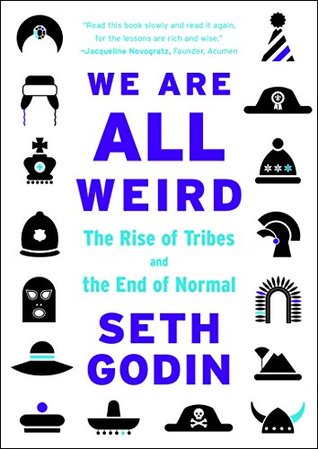More on this book
Community
Kindle Notes & Highlights
by
Seth Godin
Read between
October 30 - November 5, 2017
Either you’ll want to spend your time and effort betting on mass and the status quo—and trying to earn your spot in this crowded mob—or you’ll abandon that quest and realize that there are better opportunities and more growth if you market to and lead the weird. Two decisions you’ll need to make within the hour: 1. Do you want to create for and market to and embrace the fast-increasing population that isn’t normal? In other words, which side are you on—fighting for the status quo or rooting for weird? and 2. Are you confident enough to encourage people to do what’s right and useful and
...more
We’re coming to the end of a century of industrialism, a century when manufacturing, marketing, politics, and social systems were all in alignment, all organized to push us toward the center. The way of the world is now more information, more choice, more freedom, and more interaction. And yes, more weird.
Productivity compounds. Right now, we gain wealth from inventions made a hundred years ago, discoveries that our parents or grandparents made, shortcuts that were discovered long before we got to work. The ever more networked nature of our world means that we have huge assets at our disposal—laser cutters, roadways, chemical compounds, and innovative ways of processing ideas—all standing by, waiting for us to do something new.
The Pew Internet and American Life Project reports on the habits of millions of Internet users. According to the report, “Many enjoy the social dimensions of involvement, but what they really want is to have impact. Most have felt proud of a group they belong to in the past year and just under half say they accomplished something they couldn’t have accomplished on their own.”
Our culture, particularly in the United States, is still about buying stuff. And weird would go only so far as a cultural force here if there weren’t souvenirs and junk to buy to fuel our weirdness. Without stuff to buy to support our passions, I fear that many of our passions would fade. Never fear. Marketers have shifted gears and are leading the push to weird. The smart ones are in fact comarketing with parts of the market instead of marketing at the masses.
And as they identify and connect with these non-mass pockets of interest, they’re encouraging further weirdness from whatever niche they are in.
If you persist in trying to be all things to all people, you will fail. The only alternative, then, is to be something important to a few people. And to get there? To get there you must disappoint some slightly engaged normal folks, who, to tell the truth, can probably live just fine without you.
If you cater to the normal, you will disappoint the weird. And as the world gets weirder, that’s a dumb strategy.
This explosion of choice and variation has a significant cultural impact. It sets us free to spin and gambol at random, getting weirder at every turn because once you’re a little out of sync, there’s little reason to avoid getting a little more out of sync.
So much of marketing and culture is about consumption, because that’s where the money is. We measure, tweak, and improve the way we buy and sell, because that’s all in a good day’s work, at least in a society where money is the thing we measure and try to grow. But consumption is not why we’re here, consumption is not the point. The very same dynamic that is changing the world of marketing is changing the way we govern ourselves, raise our families, and take care of our health. The bell curve (and its spread) has an impact on our ideas and our culture, regardless of whether we are buying,
...more
Ronald Inglehart and other researchers report that the ability to be weird, the freedom to make choices, and the ability to be heard are the factors most highly correlated with happiness around the world. Regardless of income or race or geography, when we let people choose among things that are important to them, they become happier. More varieties of jeans doesn’t necessarily make people happier, of course, but the opportunity to live where they want, say what they feel, express their desires, and choose a path certainly does.
It’s human nature to be weird, but also human to be lonely. This conflict between fitting in and standing out is at the core of who we are.
We don’t like the advertising that’s not for us, not about us, not interesting to us. But talk to me, directly to me, about something relevant and personal, and I love you for it.
The challenge of your future is to do productive and useful work for and by and with the tribe that cares about you. To find and assemble the tribe, to earn their trust, to take them where they want and need to go.


